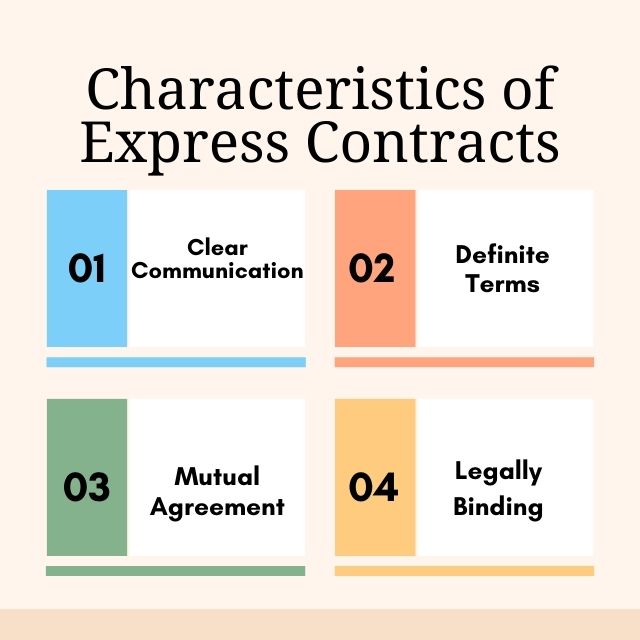In the multifaceted realm of legal agreements, the nuances between express and implied contracts play a pivotal role in defining the boundaries and obligations of the parties involved. For businesses and individuals navigating the complexities of contractual relationships, a clear understanding of these distinctions is not just beneficial; it’s essential. Express contracts are usually straightforward, characterized by clearly articulated terms and conditions that are either written or verbally communicated. They represent the quintessential model of contractual agreements, where everything is laid out with precision and clarity.
Conversely, implied contracts operate in a more subtle and often complex domain. These contracts are formed not by explicit words but through the conduct, actions, or circumstances of the parties involved. They rely on unspoken understandings and assumptions, which can be inferred from the behavior or the situational context of the contractual relationship. While not as overt as express contracts, implied contracts are equally binding and enforceable, yet they carry a level of ambiguity that can lead to unique legal challenges and interpretations.
This article delves into the intricate differences between these two fundamental types of contracts. By exploring their respective characteristics, legal standings, and practical implications, we aim to provide a comprehensive understanding of how express and implied contracts operate in the real world. We’ll examine how these contracts are formed, their enforceability, and the typical scenarios where each type is prevalent. Understanding these concepts is crucial for anyone engaged in contractual relationships, whether in personal dealings, business transactions, or more complex legal arrangements. Through this exploration, readers will gain insight into how both express and implied contracts shape and influence the dynamics of legal obligations and rights.
What are Express Contracts?
Express contracts stand as a fundamental component in the realm of legal agreements, distinguished by their clarity and explicitness. These are the types of contracts most people envision when they think of agreements. In an express contract, the terms and conditions are laid out with precision, leaving little room for interpretation or ambiguity. Whether articulated orally or in writing, express contracts are about clear communication and mutual understanding.
Characteristics of Express Contracts
Express contracts are defined by several key characteristics, each contributing to their straightforward nature.

- Clear Communication: The foundation of an express contract is its clear communication. The terms are explicitly stated, leaving no doubt as to the intent and obligations of the parties involved. This can be achieved through written documents, like contracts and agreements, or through oral declarations, where the terms are verbally articulated.
- Definite Terms: Express contracts include all the essential elements in clear terms. This includes specifying details like price, quantity, quality of goods or services, duration of the contract, and any other conditions crucial to the agreement. The precision of these terms helps in avoiding misunderstandings and potential disputes.
- Mutual Agreement: Another hallmark of express contracts is the evident mutual consent – a clear offer and acceptance by the parties involved. This mutual agreement signifies that all parties have a common understanding and are in accord with the contract’s terms.
- Legally Binding: Express contracts are legally enforceable. Since the terms are clear and agreed upon, these contracts hold significant weight in legal proceedings, should disputes arise.
Application in Business Transactions
Express contracts are the cornerstone of business transactions, providing a foundation of clarity and predictability in a diverse range of commercial activities. These contracts, known for their explicit terms, play a vital role in streamlining business operations and mitigating potential disputes. They are commonly employed in a variety of settings, from straightforward purchase agreements to intricate service contracts, catering to the dynamic needs of the business world.
- Facilitating Clear Agreements: In the realm of business, express contracts simplify transactions by clearly delineating the terms. This clarity is invaluable, especially in transactions that involve complex details or significant sums of money. For instance, in a sales agreement, an express contract would specify the item or service being sold, the price, delivery details, and the responsibilities of each party. This precision minimizes the chances of misunderstandings and lays a clear path for the execution of the transaction.
- Legal Certainty and Enforcement: Express contracts offer legal certainty. Their explicit nature means that each party’s obligations and rights are defined clearly, making these contracts straightforward to enforce in legal settings. This clarity is particularly crucial in situations where disputes arise, as the written or spoken terms can be referenced to resolve disagreements.
- Building Trust and Cooperation: Moreover, express contracts foster an environment of trust and cooperation between parties. By agreeing to well-defined terms, businesses and individuals can engage with one another confidently, knowing that their interests are protected. This trust is fundamental in establishing long-term business relationships and networks.
Diverse Business Applications
Express contracts find their application in various aspects of business. They are not limited to sales and service agreements but extend to employment contracts, leasing agreements, partnership agreements, and more. In each scenario, the clear terms set out in an express contract provide a framework that guides the conduct of the parties involved.
In summary, express contracts are indispensable in the business world for their role in ensuring clarity, legal certainty, and operational efficiency. They reduce the risk of conflicts, streamline business operations, and build a foundation of trust and cooperation. Their straightforward and unambiguous nature makes them a reliable tool for outlining and safeguarding the rights and responsibilities in a multitude of business transactions. For anyone navigating the complexities of business dealings, a thorough understanding and effective utilization of express contracts are vital for success and legal compliance.
Understanding Implied Contracts
In the legal tapestry of contracts, implied contracts present a unique and nuanced dimension. These contracts differ significantly from express contracts in that they are not explicitly stated in written or oral form. Instead, they are inferred from the actions, conduct, or circumstances of the parties involved. Despite their subtle nature, implied contracts are as legally binding as their express counterparts, offering a framework for fairness and obligation in situations where formal agreements are absent.
Types of Implied Contracts
Implied contracts are primarily of two types:
- Implied in Fact: These contracts arise from the behavior or situation of the parties involved. For instance, when a person sits in a barber’s chair, it’s implied they’ll pay for the haircut. The mutual understanding and expectations, even if not verbally communicated, form the basis of the contract.
- Implied in Law (Quasi-Contracts): This category is slightly more abstract. Here, a contract is imposed by a court to prevent one party from being unjustly enriched at the expense of another. It’s not based on an actual agreement but rather on a legal duty imposed to uphold fairness. For instance, if someone receives goods or services accidentally and benefits from them, the court may impose a contractual obligation to pay for them, despite the absence of an agreement.
Characteristics of Implied Contracts
Implied contracts share several common characteristics:
- Unspoken Understanding: These contracts are grounded in the understanding deduced from actions, circumstances, or general practices, rather than explicit communication.
- Reasonable Expectation: In implied contracts, there’s an underlying assumption that if one party provides a service or goods, the other party has a reasonable expectation to compensate for them.
- Reliance on Conduct: The agreement is often inferred from the ongoing relationship or conduct of the parties. Their actions suggest a mutual agreement or understanding that forms the basis of the contract.
Legal Challenges
Navigating the legal complexities of implied contracts can be particularly challenging due to their inherent non-explicit nature. Unlike express contracts, where the terms are clearly defined and documented, implied contracts require a judicial interpretation of behaviors and circumstances. This interpretation is crucial to establish the existence and terms of such a contract.
Proving Implied Contracts in Court
- Establishing a Pattern: Legal challenges in proving an implied contract involve demonstrating a consistent pattern of behavior or a set of circumstances that clearly indicates an agreement between the parties. Courts will look for a regularity of actions that suggests a mutual understanding or expectation.
- Inference from Circumstances: The inference of terms in an implied contract must be reasonable and justifiable based on the context and interactions of the parties involved. This might include the history of dealings, industry practices, and the nature of the transaction.
- Reliance and Expectation: A key aspect is proving that one party had a reasonable expectation of receiving a certain outcome based on the other party’s conduct, and that they relied on this expectation in their actions.
Practical Implications
Implied contracts play a significant role in everyday life, often without explicit acknowledgment by the parties involved. In many common transactions and interactions, there are unspoken agreements that guide our conduct.
- Everyday Transactions: For instance, when you dine at a restaurant and order food, there’s an implied contract that you’ll pay for the meal. No formal agreement is signed, but the mutual expectations are clear.
- Professional Services: In areas like legal or medical services, even without a written contract, there’s an implied understanding that the professional will provide their services, and the client will compensate them accordingly. This understanding is based on the norms and practices of the industry.
- Social Contracts: Beyond commercial transactions, implied contracts can be seen as a form of social contract that underpins many day-to-day interactions, fostering trust and cooperation within communities.
Legal Standing of Express and Implied Contracts
In the legal arena, both express and implied contracts hold significant weight and are enforceable, but the manner in which their terms are established and proven in court differs markedly. This distinction is crucial in understanding how these contracts are interpreted and executed in real-world scenarios.
Express Contracts
Express contracts are typically straightforward to enforce due to the clarity of their terms. These contracts are laid out with explicit detail either through written documentation or verbal agreements. The clear evidence of terms, such as signed documents, emails, or recorded conversations, provides concrete proof of the agreement and its specifications. This explicitness simplifies the legal process, making it relatively uncomplicated to establish the terms in a dispute.
Implied Contracts
Implied contracts, on the other hand, pose more of a challenge in terms of legal enforcement. These agreements rely on the conduct and expectations of the parties involved, which can often be subjective and open to interpretation. To prove an implied contract in court, one must demonstrate a pattern of behavior or a set of circumstances that imply an agreement. This could involve showcasing a history of actions, reliance, and an established relationship between the parties, which suggest a mutual understanding, even in the absence of explicit terms.
Practical Implications and Real-World Applications
- In Business Transactions: In the business world, express contracts are a mainstay for their definitive clarity and certainty. They are ideal for formalizing specific agreements like sales, services, or partnerships. However, in the context of ongoing business relationships, implied contracts often emerge. Regular dealings between parties can establish certain expectations and understandings, such as the standard of goods or recurring service arrangements, that form an implied agreement.
- In Employment: Employment relationships frequently involve both express and implied contracts. While an employment contract may explicitly outline job responsibilities, salary, and other terms, aspects such as workplace conduct, employee-employer expectations, and job security may be governed by implied contracts, often derived from industry norms, company culture, or the consistent behavior of the parties.
- In Service Industries: The service industry is a common ground for implied contracts. For instance, when you dine at a restaurant, there’s an implied agreement that you will pay for the food and service received. These contracts are based on the customary practices and the reasonable expectations of the parties, even without a written agreement.
In conclusion, both express and implied contracts are pivotal in legal and practical contexts, each serving essential roles in various domains. Understanding their differences, legal enforceability, and applications is key to navigating the complexities of contractual relationships. Whether in business transactions, employment, or service industries, these contracts form the backbone of countless interactions and exchanges, highlighting the versatility and scope of contract law.

Challenges in Dealing with Implied Contracts
The main challenge with implied contracts is the ambiguity in proving their existence and terms. Disputes can arise from differing interpretations of actions and assumptions, leading to legal complexities.
- Evidentiary Difficulties: Proving an implied contract in court often hinges on circumstantial evidence, which can be open to interpretation and harder to substantiate compared to the clear terms of express contracts.
- Misinterpretation of Conduct: Actions and conduct that one party views as forming a contract might be interpreted differently by the other party, leading to disputes and misunderstandings.
Best Practices for Managing Contractual Relationships
Effective management of contractual relationships is pivotal in ensuring successful business operations and legal compliance. Understanding the nuances between express and implied contracts and implementing best practices can significantly reduce risks and enhance the efficiency and clarity of agreements.
- Prefer Express Contracts: When feasible, it’s advisable to opt for express contracts. These contracts, with their explicit terms and conditions, provide a high level of clarity and reduce the potential for misunderstandings and disputes.
- Written Over Oral: While oral contracts can be express, written contracts offer tangible evidence that can be invaluable in resolving disputes.
- Detailing Terms: Clearly outline all relevant terms, including obligations, timelines, payments, and any other conditions pertinent to the agreement.
Document Interactions in Ongoing Relationships
In long-term business relationships, it’s crucial to maintain a record of interactions, especially where implied terms might come into play.
- Record Keeping: Keep detailed records of meetings, decisions, and actions taken. This practice can be instrumental in establishing the terms of an implied contract.
- Email Confirmations: After verbal agreements or discussions, follow up with an email summarizing the key points. This helps to solidify understanding and provides a written record.
- Ensure Clear Communication: Effective communication is the cornerstone of both express and implied contracts.
- Avoid Jargon: Use clear, straightforward language to avoid ambiguities.
- Active Listening: Ensure mutual understanding through active listening and by seeking confirmations or clarifications.
Seek Legal Advice
Legal counsel can be invaluable in navigating the complexities of contract law.
- Drafting Contracts: Use legal expertise to draft robust express contracts that clearly delineate rights and responsibilities.
- Understanding Implied Terms: Consult lawyers to understand potential implied terms in ongoing business dealings or relationships.
Grasping the differences between express and implied contracts is crucial for navigating the complex landscape of contractual obligations. Express contracts, with their clarity and straightforward enforcement, are generally preferable. However, implied contracts, which are equally binding, necessitate a deep understanding of unspoken terms and conduct.
Employing best practices like preferring express contracts, documenting interactions, clear communication, and seeking legal advice is imperative for managing these relationships effectively. As the business environment evolves, adeptness in recognizing and handling both express and implied contractual elements remains a critical skill for success and compliance. Adhering to these practices ensures that contractual relationships are not only legally sound but also mutually beneficial and aligned with business goals.
Did you find this Legitt article worthwhile? More engaging blogs about smart contracts on the blockchain, contract management software and electronic signatures can be found in the Legitt Blogs section. You may also contact Legitt to hire the best contract lifecycle management services and solutions.
FAQs on Express vs Implied Contracts
What is an express contract?
An express contract is a clear agreement where terms and conditions are explicitly stated, either orally or in writing, leaving little to no room for ambiguity.
What is an implied contract?
An implied contract is formed based on the actions, conduct, or circumstances of the parties involved, rather than explicit words, and is inferred from the situation.
Are implied contracts legally enforceable?
Yes, implied contracts are legally enforceable, but proving their existence and terms in court can be more challenging compared to express contracts.
What are common challenges with implied contracts?
The main challenges include ambiguity in proving their existence and terms, evidentiary difficulties, and potential misinterpretation of conduct leading to disputes.
How can you prove an implied contract in court?
Proving an implied contract typically involves demonstrating a clear pattern of behaviour or circumstances that reasonably infer the contract's terms.
What is the best way to manage contractual relationships?
Prefer express contracts for clarity, document interactions, communicate clearly in all dealings, and seek legal advice for drafting contracts and understanding implications.
How important is clear communication in contract management?
Clear communication is crucial in avoiding misunderstandings and disputes in both express and implied contracts.
Why should businesses prefer express contracts?
Express contracts are preferred for their clarity, explicit terms, and ease of enforcement, reducing the risk of legal complications.
Can interactions in ongoing business relationships imply a contract?
Yes, regular interactions in ongoing business relationships can imply certain terms and expectations, forming an implied contract.
What role do legal professionals play in contract management?
Legal professionals help understand the implications of implied terms, draft effective express contracts, and provide guidance on contractual obligations.





















